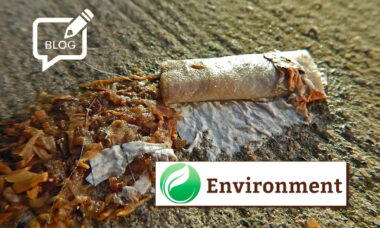 Climate change, along with sustainability, waste and environmental pollution – issues which are all inextricably interlinked – add up to arguably the big issue of our times. And while no industry, from aviation to mining, farming to fishing, can pretend to be uninvolved, the tobacco/e-cigarette industry is just as inescapably bound up in the debate.
Climate change, along with sustainability, waste and environmental pollution – issues which are all inextricably interlinked – add up to arguably the big issue of our times. And while no industry, from aviation to mining, farming to fishing, can pretend to be uninvolved, the tobacco/e-cigarette industry is just as inescapably bound up in the debate.
It is the big story, and set to become bigger.
Which is why readers of TobaccoIntelligence will have noticed the appearance of the Environment logo above accompanying some of our news analysis pieces, regulatory reports and trackers. Watch out for it appearing more frequently as the ongoing story takes on extra dimensions and added importance.
For example, we reported last week on a call by Belgium’s environment minister and others for cigarette filters to be banned.
Zakia Khattabi’s persuasive argument included some well considered ideas as to why filters might actually make cigarette-smoking more, not less, dangerous. But the crucial, less contentious point is the environmental harm done by discarded filters and the microplastics they release as they break down.
Belgium’s Superior Health Council, from whom Khattabi commissioned a report on the subject, had short shrift too for any suggestion that making filters biodegradable would in any practical sense circumvent or mitigate the damage.
The polluter-pays principle
It’s not little Belgium against the rest, either.
The Global Center for Good Governance in Tobacco Control (GGTC), through its Stop Tobacco Pollution Alliance – an international pressure group which claims the support of a large number of public health bodies – has instituted a campaign “to align plastics policies with tobacco control and make tobacco polluters pay”.
It says: “Cigarette butts are the most pervasive toxic single-use plastic litter – and the tobacco industry knows this.”
The World Health Organization (WHO) Framework Convention on Tobacco Control (FCTC) also advocates holding the tobacco industry accountable for the environmental harm caused by its products.
And while the GGTC says authoritatively that the microplastics in cigarette filters “take over a decade to decompose, leaching out chemicals and metals such as arsenic, lead and ethyl phenol that are toxic to terrestrial and aquatic life”, the news is scarcely better on single-use vapes.
Our sister service ECigIntelligence has reported – and blogged – more than once about the environmental harms of disposables and about initiatives, notably but by no means exclusively in the UK, France and Germany, to ban them. Initiatives which have fallen short up to now but are by no means guaranteed to continue failing.
It’ll all come out in the greenwash
The case against has now been put succinctly by the campaign movement Greenpeace, which asks rhetorically “Are disposable vapes bad for the environment?” The answer, of course, is a loud and clear “yes”.
Meanwhile, our latest updated EU regulatory tracker on environmental initiatives shows that the European Commission wants companies to be able to substantiate any green claims they make. The proposal would require firms to use standard methods for quantifying claims.
The hope is that this would make environmental claims reliable, comparable and verifiable across the EU to reduce “greenwashing” (deliberately giving a false impression of environmental impact). This, in turn, would enable consumers to make informed purchasing decisions based on reliable and verified information.
This is a story which will run and run. To keep following, keep looking out for that Environment logo here on TobaccoIntelligence.
And of course there’ll be more there too on related issues surrounding packaging and batteries, both of which the EU and other regulatory bodies have very much on their radar – and which, of course, apply just as much to heated tobacco and potentially to other yet-to-be-launched novel tobacco products too. In fact, just as with disposable e-cigarettes, the more successful they become, the more they will impact on the environment and the more environmental regulation will come into play.
Watch this space.
– Aidan Semmens TobaccoIntelligence staff
Photo: Wikimedia Commons






